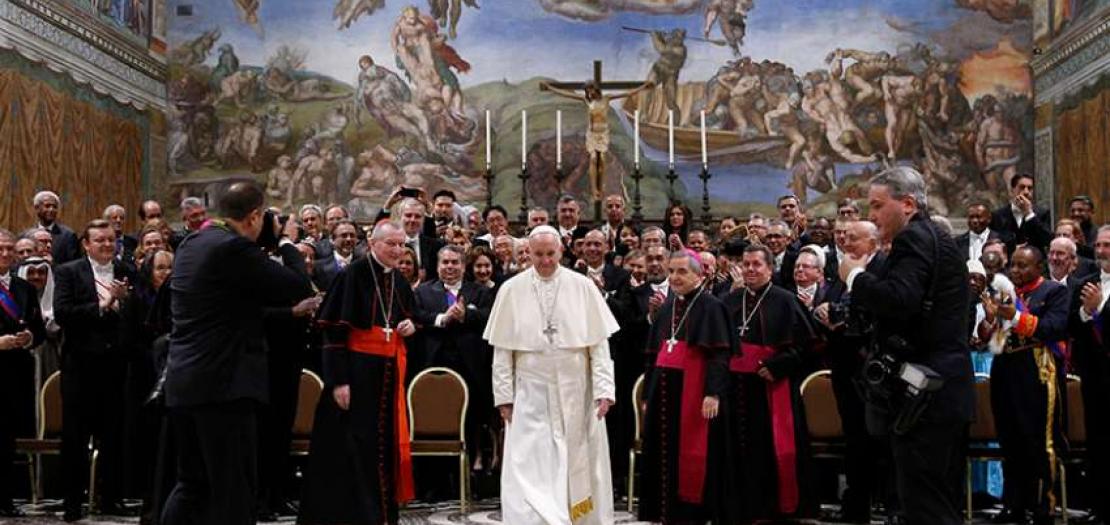Issued by the Catholic Center for Studies and Media - Jordan. Editor-in-chief Fr. Rif'at Bader - موقع أبونا abouna.org
The diplomacy of peace
Marking Christmas and new year celebrations, His Holiness Pope Francis delivered his "Urbi et Orbi message given at midday in Saint Peter's Square, during which he addresses the human concerns with a panoramic tour of the most human tragedies at the present time, in order to form a renewed call for peace within the diplomacy led by the Catholic Church in the world, known as Diplomacy of Peace. What is striking this year is that the tragedies of the Arab countries took the lion's share.
He started addressing the situation in Syria. He said, "Let us think of the Syrian people who have suffered from a decade of war which led to numerous victims and exorbitant numbers of displaced people."
Then he proceeded to talk about Yemen saying, "Let us listen to the cries of the children of Yemen, a country witnessing a horrible catastrophe ignored by all which has been lasting for years amidst silence while leaving hundreds of killed every day."
On the country of the Cedar, he said' Let us think of Lebanon that has been suffering from an unprecedented crisis where economic and social situation cause grave concern.''
He also pleaded with the Almighty God for Sudan "so that numerous pains suffered by the brothers and sisters caused by internal disputes would be alleviated."
The Pope also addressed Mesopotamia following the historic visit he paid to this country last March. He said: "Let's look at Iraq, which is finding it difficult to rise after a long struggle."
On the occasion of the Pope’s address of Iraq, we can go back to 2002, that is 20 years ago when the drums of war were beating against Iraq, and Pope John Paul II’s voice resounded in the center of Europe and the world when he said: "No to war, because war will be a loss for all, and there will neither be a winner nor a loser." Had the world listened at that time to the voice of moderation, peace, love and dialogue, then brotherly Iraq would have been spared many tragedies that befell it.
On the Israeli-Palestinian conflict he said, "Let us remember the continued and insoluble tension between the Palestinians and the Israelis as well as its socio-political ramifications." He also extended encouragement to the city of Nativity, Bethlehem, saying, "Let us not forget Bethlehem, the place where Lord Jesus Christ was born, as the city is experiencing difficult times resulting from the Corona pandemic which obviated the arrival of pilgrims to the Holy Land, thus negatively affecting the life of the residents."
The Pope did not confine his address to the Arab countries, but he also talked about the human tragedies in the world especially in Ethiopia, South Sudan, Ukraine, Afghanistan, Myanmar and the African Sahel region.
His Holiness also touched on the current affairs such as victims of violence against women, the victims of bullying, in addition to violations committed against children and adolescents. He also pleaded with the Almighty God to give solace and love to the elderly, unity and tranquility to families, consolation to the sick and people in need and to reward those who care for them. He also prayed for overcoming the health crisis and its ramifications so that vaccines would be availed to all people with justice and equality, especially to the most needy.
It is great to have a voice calling for peace and for reminding the world of the human tragedies that are not only numbers and names, but are rather daily tragedies. It suffices to see daily images of hungry children in Ethiopia who are starving as humanitarian aid is denied access to the stricken families. This constitutes a stern call to revive the sleepy conscience in this world. Of course, we do not forget that the epidemic is still prevalent in the world and that there are numerous cases of infection almost in all parts of the world, while some countries have not yet received vaccines and this matter poses danger to the population, and danger to the entire world owing to the continued emergence of virus variants. Furthermore, there is an ethical dilemma represented in the lack of justice and equality among all humans, as some countries have begun to give the third and even the fourth doses of the vaccine while there are countries that still lack the first dose.
The clerics' message cannot provide immediate solutions to political dilemmas, but it does provide the clue to resolving them, namely dialogue for which a message gives a great deal of space. There is danger at the international level by negating dialogue, and the risk that a complex crisis will lead to choosing the shortest path instead of the longer path of dialogue which can only lead to conflict resolution as well as mutual and lasting benefits.
abouna.org@gmail.com







